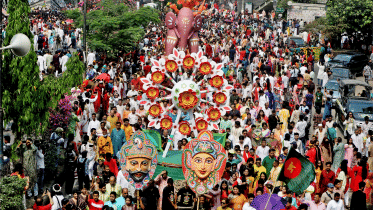Pahela Baishakh
Pahela Baishakh celebrations across campuses
Universities across Bangladesh celebrate Pahela Baishakh.
15 April 2025, 10:21 AM
Stars usher in Baishakh with heartfelt reflections
The Bangla calendar has turned a new year and bidding goodbye to 1431, we welcome 1432, bringing with it fresh energy, renewed hopes, and a collective dream of new beginnings.
14 April 2025, 15:30 PM
Nationwide celebrations of Pahela Baishakh
The nation joyfully welcomes the Bangla New Year 1432 today
14 April 2025, 08:40 AM
Of music, colours and festivities: Nation welcomes Bangla New Year
Pahela Baishakh, the first day of the Bangla calendar, is being celebrated with music, colourful rallies, and festive events.
14 April 2025, 05:31 AM
What is Pahela Baishakh if not a dawn of hope?
As the crimson sun rises on the first day of Baishakh, its golden rays spill over a land alive with colour, music, and tradition
14 April 2025, 05:25 AM
What does the Bangla New Year mean to me?
On the first day of the Bangla New Year, every nook and corner of Bangladesh is brightened.
14 April 2025, 03:40 AM
Thousands gather at Ramna Batamul to welcome Bengali New Year
Thousands of Bangalees ushered in Bengali Year 1432 at Ramna Batamul on Monday morning, as Chhayanaut’s iconic Pahela Baishakh celebration marked its 58th edition with renewed hope, harmony, and heritage.
14 April 2025, 02:53 AM
A confluence of nature and culture
It is essential to understand how rural communities establish their cultural relationships with the ecosystems across different seasons.
14 April 2025, 02:00 AM
Let us not squander this opportunity: CA
“Let it be this new year’s resolution that we build a new Bangladesh free of discrimination,” urged the chief adviser.
14 April 2025, 01:46 AM
Chhayanaut ushers in 1432 at Ramna Batamul with Raag Bhairav
As the sun rose over Dhaka, Chhayanaut’s Pahela Baishakh celebration for the Bengali year 1432 began at Ramna Batamul. The theme of Chhayanaut's Pahela Baishakh celebration this year is "Amar Mukti Aloy Aloy" (my freedom lies in light). Through this theme, Chhayanaut aims to convey a message of hope, resilience, and renewal.
14 April 2025, 01:09 AM
The spirit of defiance and freedom fuels Pahela Baishakh
As the nation now stands on the cusp of renewal, Pahela Baishakh 1432 arrives at a time when the people of Bangladesh are eager to reclaim their cultural voice—seeking a deeper connection to its identity, heritage, and hope. For centuries, it has been an occasion of collective celebration, resilience, and unity.
13 April 2025, 18:03 PM
Pahela Baishakh special series ‘Nonsense’ to premiere on Bongo
The family drama series “Nonsense” is set to premiere this Pahela Baishakh on the OTT platform Bongo. Directed by Rakesh Basu, the six-episode series features Zakia Bari Mamo, Intekhab Dinar, Aisha Khan, Naziba Basher, Mili Basher, Shahidul Alam Sachchu, and Tony Michael Gomes, among others.
13 April 2025, 05:47 AM
Pahela Baishakh: Origins and celebrations
Pahela Baishakh, celebrated on April 14, marks the Bengali New Year, rooted in Emperor Akbar’s reform aligning taxes with harvests. Today, it’s a vibrant cultural festival filled with music, processions, traditional food, and colourful attire.
12 April 2025, 08:54 AM
Pahela Baishakh: Chhayanaut all set for celebrations
Chhayanaut is all set to celebrate Bangla New Year, Pahela Baishakh, with its iconic cultural programme at Ramna Batamul in Dhaka.
11 April 2025, 19:48 PM
‘Mangal Shobhajatra’ renamed to ‘Borsho Boron Anondo Shobhajatra’
"The decision was not made under any external pressure"
11 April 2025, 06:23 AM
‘Cultural healing’ and ‘inclusivity’ key in Bengali New Year celebrations as Ministry announces plans
Farooki declared that this year’s New Year celebrations would bring together not just Bengali citizens, but also 27 ethnic communities from across the country. “Diversity is our most powerful and beautiful asset,” he said.
9 April 2025, 11:20 AM
No threat centring Pahela Baishakh
Home Adviser Jahangir Alam Chowdhury yesterday said they have not received any security threats centring Pahela Baishakh celebrations.
8 April 2025, 18:53 PM
How did Pahela Baishakh become a public celebration?
Although the Bengali calendar has been in use for centuries, the tradition of celebrating Pahela Baishakh as a public festival is a relatively modern development.
8 April 2025, 09:33 AM
Ethnic groups to feature in next Mangal Shobhajatra
An inclusive Mangal Shobhajatra will be held on Pahela Baishakh this year, featuring participation from various ethnic communities, including Chakma, Marma, Santal, and Garo.
24 March 2025, 18:00 PM
5 documentaries to watch on Netflix this break
Who doesn’t love Netflix documentaries? The suspense and thrill of a well-produced Netflix original leave viewers enchanted, anticipating more. And with the Eid and Pahela Baishakh break coinciding together, now’s the perfect time to gather with friends and family to sit back and binge-watch all that Netflix has to offer!
14 April 2024, 10:28 AM






















